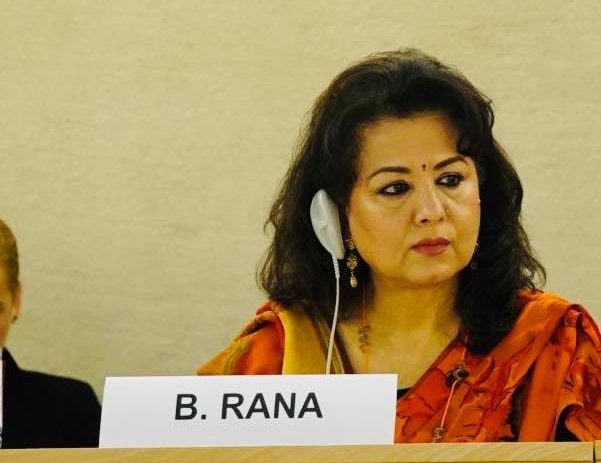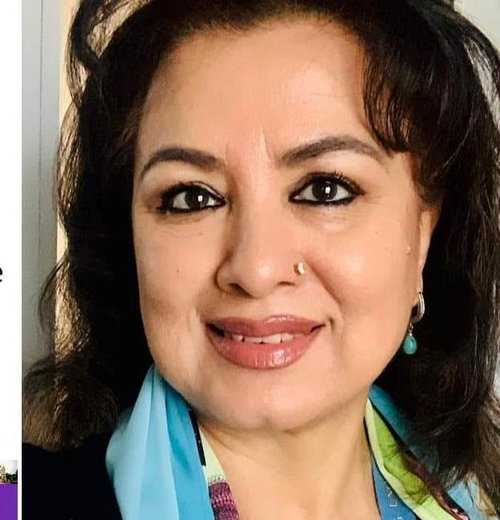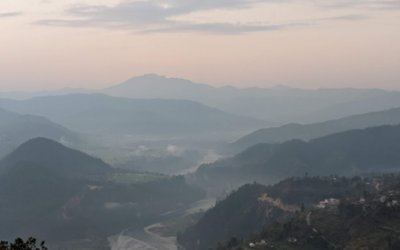
Bandana Rana, Vice-chair of Committee on the Elimination of Discrimination against Women (CEDAW) and Focal Point - Women in Conflict Prevention, Conflict and Post Conflict Situations, said that the work of the CEDAW Committee has been crucial in strengthening the accountability of State parties in accelerating the implementation of the Beijing commitments. Rana said that with its legislative and binding framework the Convention is the strongest mechanism to promote and protect women’s human rights. (Read excerpts of her statement below)
Addressing the 43rd session of the Human Rights Council High-level panel discussion commemorating the twenty-fifth anniversary of The Beijing Declaration and Platform for Action adopted at the Fourth World Conference on Women Accelerating the commitments of the Beijing Declaration and Platform for Action, Rana, Chair - Global Network of Women Peacebuilders (GNWP) and Co-Founder & Strategic Adviser - Saathi, Nepal, said that she has worked directly with survivors of violence, founded women’s shelters, worked at the grassroots to the national and global level through various NGOs and Networks she has co-founded, as well as partnered with government entities for promoting gender equality.
Chair by Ms.Elisabeth Tichy-Fisslberger, president of the Human Rights Council at Palais des Nations, Geneva, Rana said that the different needs of women, in the public as well as the private sphere, must be addressed. She said that the Asia Pacific region in its review of the Beijing+25 has identified 6 priority areas to advance women's and girl's rights in 2020 and beyond.
Delivering the opening remarks, Ms. Michele Bachelet, United Nations High Commissioner for Human Rights, said that the high-level panel discussion will mark the twenty-fifth anniversary of the Fourth World Conference on Women and
the adoption of the Beijing Declaration and Platform for Action.
The panelists included Jeppe KOFOD, Minister for Foreign Affairs of Denmark, Chen Xu, Ambassador and Permanent Representative of China to the United Nations Office at Geneva and other international organizations in Switzerland, Phumzile Mlambo-Ngcuka, Executive Director of UN-Women, Ms. Bandana RANA, Vice-Chair of the Committee on the Elimination of Discrimination against Women (CEDAW) and Ms.Magalys Arocha-Dominguez, Expert on Human Rights and Gender Equality.
The panel discussion was organized with an objective to provide a space to celebrate the vision of women’s rights as human rights articulated in the Beijing Declaration and Platform for Action, recall the progress made in the past 25 years towards its implementation, discuss the continued relevance of this visionary document to address remaining and new challenges and accelerate progress towards the full and equal enjoyment of all human rights and fundamental freedoms by all women and girls
In accordance with Human Rights Council resolution 42/14, the High Commissioner will submit a summary report on the proceedings and issues addressed during the panel discussion to the Human Rights Council at its forty-fifth session and to the General Assembly at its seventy-fifth session.
In its resolution 42/12, the Human Rights Council decided to convene, during the high-level segment at its forty-third session, a high-level panel discussion to commemorate the twenty-fifth anniversary of the Fourth World Conference on Women, with a particular focus on the implementation of the Beijing Declaration and Platform for Action and the outcome documents of its review conferences, as well as on achievements, best practices and challenges in this regard.
In two hours-long discussion, delegations from different parts of the world attended and interacted with the panelists on the various issues regarding the Beijing Declaration and Platform for Action and women’s right situation.
The Work Of The CEDAW Committee Has Been Crucial
By Bandana Rana

In 1995, I was in Beijing as a young journalist from Nepal attending the fourth world conference of Women. The euphoria and the power of collective movement building, in Beijing, was such, that after returning from Beijing I left working for the mainstream media which was a predominantly malestream, as I felt the strong urge to work directly with, and for those women and girls facing discrimination and exploitation. Since then there has been no turning back.
I have worked directly with survivors of violence, founded women’s shelters, worked at the grassroots to the national and global level through various NGOs and Networks I have co-founded, as well as partnered with government entities for promoting gender equality. The groundbreaking Beijing Platform for Action has been a strong guiding framework throughout my journey as an advocate for gender equality and peace, and 25 years later remains even more relevant to protect human rights and gender equality
Today I am in the CEDAW Committee and I strongly feel that I am in the right place as this is where I can assess the impact of the commitments made in Beijing. The work of the CEDAW Committee has been crucial in strengthening the accountability of State parties in accelerating the implementation of the Beijing commitments. With its legislative and binding framework, the Convention is the strongest mechanism to promote and protect women’s human rights
Through its 189 States parties and the hundreds of activists, civil society organizations and regional organizations which are constantly advocating for its implementation, the CEDAW Convention has become a leading force in ensuring the promotion, protection, and fulfillment of the powerful message that “Women's rights are human rights” fostered by the Beijing Platform for Action. The Convention offers a unique binding and human rights-based foundation for furthering the full implementation of the BPFA
We cannot implement it if we cannot measure it. The CEDAW Committee through its constructive dialogue and recommendations helps member states to measure their progress and identify areas where efforts need to be intensified. CEDAW tells member states where they stand on these commitments and reinforce their commitments for further action. So this is where I see the interconnectedness of Beijing commitments and the actual change that takes place on the ground be it constitutional amendments or legislative and policy reforms for addressing all forms of discrimination and establishing gender equality.
The CEDAW Committee is a voice for the millions who do not have a voice. The progress brought about through the CEDAW mechanism has been life-changing for many young generations.
With its legislative framework, the CEDAW Committee is helping member states in building their accountability to –
A World free from violence, stigma, and stereotype
A World where there are no child marriages
A World where there is equal pay for equal work
A World that establishes lasting peace and security of all
While we have seen achievements in the last twenty-five years, we have also witnessed a backlash against those gains and structural barriers underlying women’s oppression. Globally, one in three women still experience sexual or physical violence in their lifetime, women are paid less than men for doing the same work, and they continue to bear a disproportionate burden of unpaid care work. Hundreds of thousands of women still die each year from complications in pregnancy and childbirth, and less than a quarter of members of parliament are women.
Therefore, we need to create effective institutions and allocate adequate resources for women to realize their rights. We need to listen to the voices of women and young girls. The different needs of women, in the public as well as the private sphere, must be addressed
The Asia Pacific region in its review of the Beijing+25 has identified 6 priority areas to advance women and girls rights in 2020 and beyond
- Economic empowerment
- Social services and Universal Health Care
- Freedom from violence stigma and stereotype
- Participation in Decision Making
- Peaceful and inclusive societies
- Climate action and resilience building
The realization of these agendas requires transformative shifts, integrated approaches, and new solutions. A significant message which needs to be intensified global attention is that ensuring the rights of women and girls contribute to development and peace. 2020 should mark a center stage for accelerating actions on commitments. It is in this regard that the CEDAW Convention is a critical instrument to ensure the full promotion and protection of women’s rights and substantive gender equality.
The World cannot afford to regress. We have to progress and strengthen foundations and treaty body mechanisms for ensuring equality, development, and peace as aspired by the Beijing Platform for Action and for making the specific commitment to “leave no one behind” a reality. Together, we can do it.
Excerpts of the statement Rana read at the High-Level Panel Discussion on Beijing+25 in Geneva.
- Ambassador Subedi Presented The Letter Of Credence To President Of Italy
- Apr 25, 2024
- Nepal-Qatar Joint Business Council Formed
- Apr 25, 2024
- Weather Forecast: Isolated Brief Rain Is Likely To Occur At Few Places Of Koshi, Sudurpaschim And Karnali
- Apr 25, 2024
- Qatar And Nepal Ink Several MoUs, Returned Home Completing Two Days Visit
- Apr 24, 2024
- Russia Industrialists Met Prime Minister Dahal
- Apr 24, 2024
















